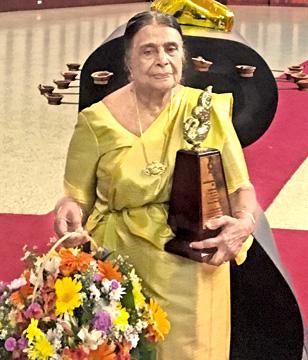
The State Literary Advisory Board in collaboration with the Arts Council of Si Lanka and the Housing, Construction and Cultural Affairs Ministry held its 62nd State Literary Awards ceremony recently under the patronage of President Maithripala Sirisena. Three prominent writers were honoured with the Sahityaratna Lifetime Award for their invaluable contribution towards the advancement of literature. One of them was Kamala Wijeratne whose outstanding contribution towards the advancement of local literature in the English language had to be honoured.
Quite naturally the occasion must have been a happy surprise for you, can we take you back to the time when it all began for you, the writing of the local literature?
“Actually my home background contributed largely to my writings. I was born in Ulapone a village 15 miles from Kandy on the Nawalapitiya road. I was successful in gaining entrance to the University of Ceylon, Peradeniya. This was in the year 1959 and I graduated in the subjects English, Sinhala and Economics, and followed it up with a Post Graduate Diploma in English as a second language in 1972 at the same university. The thirst to gain more knowledge saw me acquiring an MA in Education from the Peradeniya University. Fortune smiled on me as I was awarded a scholarship by the British Council to acquire an MA in the Teaching of English to Speakers of other Languages from the University of Edinburgh. This was in the year 1992 and after my graduation, back in Sri Lanka, I worked as a teacher in English in Anuradhapura and Kandy for something like more than 20 years.
The influence of my home background as well as my teaching experience spurred me to write my first book of poetry titled ‘The Smell of ‘Araliya’!
Considering the fact that ‘The Smell of Araliya’ turned out to be a success, did that inspire you to publish more books of poetry?
“The Smell of Araliya was published in 1983 and two years later I put out my second book of poems - “A House Divided, in 1985 and the following year “The Disinherited”. These two collections of poetry related to the growing violence and disharmony between the ethnic groups and how it affected the society.
The subsequent turbulence that took place affected the rural folk and traumatized them out of their day to day routine. For them, loss of life, loss of property, loss of opportunity, loss of expectations and hopes became the routine. Sensitively I responded to what they were going through”.
During this time Kamala Wijeratne made a switch in her career when she joined the English Teachers’ Training College, Panideniya as a lecturer in English and later moved on to the College of Education for English (Pasdunrata) and then to the National Institute of Education, Maharagama as senior project officer. While attending to her duties she released “That One Talent” in 1987 and “The White Saree and Other Poems” in 1988.
Having conducted a workshop ‘Teaching the short story’ at the 9th Oxford Conference of Teaching Literature at the Oxford University, UK in 1990 saw her release her first collection of short stories in 1999 entitled ‘Death By Drowning and other stories”. But the pull of writing poems shifted her back to release “Millennium Poems” which dealt with the concerns in our country reflecting the society - war, pollution, corruption as well as human concerns such as love and death which resulted in her winning the State Literary Award in 2004.
The devastation caused by the Tsunami, inspired Kamala Wijeratne to release a collection of poetry entitled ‘A Prayer to God Upulwan’ in the year 2008 which reflected her constant concerns of the majority rural population and not so much with the urban minority.
Not willing to close the door on her writing she went back to writing short stories and “Ten Stories” was the result which won her the State Literary Award for the best collection of short stories in 2012. There were other writings too that need to be mentioned the Potted Plant (short stories), ‘This Other Trojan Woman’ (poetry), My Green Book, ‘Impressions and Early Poems, A Compendium.
A household name among teachers of English her contribution towards the advancement of local literature is invaluable but as we understand there is one area she has not conquered so far and this is the novel. We wish her good luck to achieve it.
